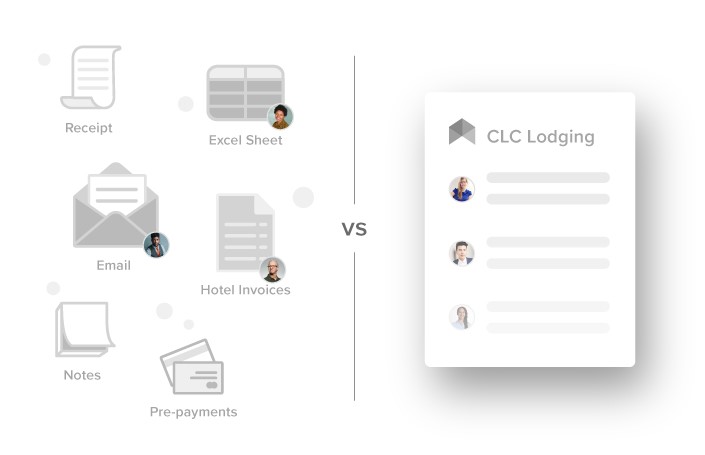
Travel managers have to juggle a lot of moving parts: employees who constantly need new or modified hotel reservations, changing corporate policies, and the fast-paced environment of the industry itself. The role can be time-consuming and complicated, and managing all of these demands—while also staying within the company’s budget—may feel like a difficult feat to accomplish.
Here are just 6 of the top challenges travel managers must address:
1. Accurate reporting and reconciliation
As employees travel around the country for various lengths of time, monitoring all of their reservations and invoices can be difficult. Travel managers may find themselves missing job codes, handling surprise errors, or reconciling unauthorized charges, and according to a recent Global Business Travel Association (GBTA) Foundation survey, only 6% of company travel managers audit their negotiated hotel contract information monthly. Many travel managers said the reason they do not perform audits is because they do not have the internal resources to do it, but inaccurate reporting may also cause many companies to overpay for their lodging programs.
2. Finding the best rates
Travel managers might find themselves spending hours searching for the highest quality, most cost-efficient lodging options located within close proximity to where they need to go. A survey by TNS Research, reported by Bluenotes, showed that small to mid-sized companies spend $33,000 on business travel per year, and each trip takes approximately 6 hours of someone’s time to find, negotiate, book and manage. Comparing different rates and negotiating with hotels to decrease rates adds time and stress to the travel manager’s booking process, and it might lead to settling for a price that’s not the best option.
3. Ensuring traveler safety
Recent research from the GBTA and Cvent revealed that traveler safety and risk management are becoming increasingly important to travel managers. Despite this increase, almost 70% of travel managers said that in times of crisis, traditional corporate travel management tools aren’t enough to locate travelers who booked directly with suppliers.
Every company has to provide duty of care to its travelers, which is the obligation to protect the health, safety, and security of its employees. This extends to time spent traveling on behalf of the company, and travel managers may be responsible for ensuring duty of care is met.
4. Keeping up with the trends
The travel industry is always changing alongside new technologies and global events. These developments may make travel management and booking easier in the long run, but learning new technologies can be a burden when added to travel managers’ already extensive list of responsibilities.
Additionally, the COVID-19 pandemic has had a massive impact on travel in the US and around the globe. Travel managers will have to work hard to meet revised policies and keep up with new initiatives like Safe Stay, the American Hotel & Lodging Association’s recently-released industry-wide standard of health and safety protocols.
5. Policy compliance
Corporate travel policy is essential for providing policies, procedures and protocols for employee travel. Travel managers are responsible for making sure that hotel reservations comply with these policies, which can become difficult when managing all of the other aspects of employee travel.
A 2018 study found that 40% of U.S. business travelers admitted to booking outside their companies’ travel policies, making it even more difficult for travel managers to regulate employee travel and bookings.
6. Work-life balance
Travel managers are often expected to be available 24/7 to answer traveler calls about changes in travel, and other issues that arise unexpectedly. The study by TNS Research found that 25% of trips change at least once before or during the trip. Travel managers have to field calls placed by travelers at all hours of the day and night, making it difficult for them to get away from their work and maintain a healthy balance between their professional and personal lives.
CLC Lodging simplifies lodging program management so that travel managers can focus on their business. CLC’s solutions include:
- Accurate, consolidated billing: CLC members can find and review all invoices in one place, making reconciliation faster and more accurate. We also conduct a comprehensive audit of 100% of hotel invoices to clear unauthorized charges and inaccurate rates.
- Traveler support and safety: Our US-based traveler support center is available 24/7/365 for reservation changes and traveler support. Members also gain access to CLC’s Traveler Tracker mapping feature, so you can locate your employees in case of an emergency.
- Hotel Rate Savings: CLC members saved $420 million in lodging costs last year by leveraging our industry-leading purchasing power. Members get pre-negotiated lodging discount rates at 15,000 hotels, plus access to thousands of Expanded Network hotels.
- Travel Policy Compliance: CLC creates customized lodging directories that adhere to our members’ exact travel policies, so companies can offer their travelers the perks they need and prevent those they don’t.
- Full Service Lodging Management: Our lodging experts can manage all aspects of your workforce travel so you can focus on your business.
Learn more about CLC Lodging’s centralized booking, reporting, and reconciliation today.
Recent Posts
-

Demolish the Biggest Frustrations in Construction Travel
Nov 19, 2024 | -

Thanksgiving 2024: What Restaurants are Open for the Holiday?
Nov 19, 2024 | -

Building a Travel Program for Project-Based Construction
Nov 08, 2024 |